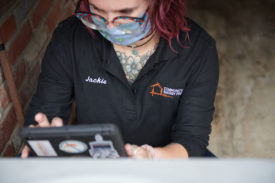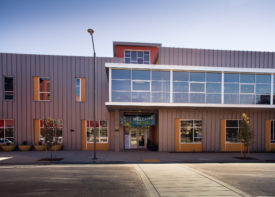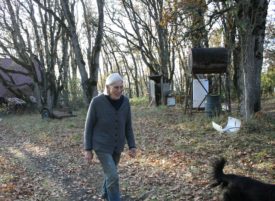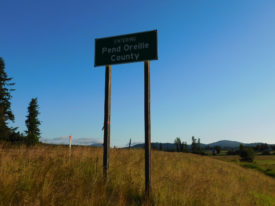Editor’s note: The following is a profile from Sightline’s green-collar jobs primer. Read more about what makes a green-collar job and how we can create more in the Northwest.
 For Rev. Deb Conklin, spreading the gospel of energy efficiency is an act of faith—and an important job.
For Rev. Deb Conklin, spreading the gospel of energy efficiency is an act of faith—and an important job.
Conklin is leading an effort to reach out to residents of Spokane’s South Perry neighborhood who are interested in getting energy audits and retrofitting their homes to reduce energy use. The upgrades save people money, and benefit the environment.
“We’re about building community and helping people build better lives,” said Conklin, pastor of the Liberty Park United Methodist Church in Spokane.
She’s part of a program called SustainableWorks that’s run by the Spokane Alliance, a coalition of churches, unions, and nonprofit organizations. After successfully boosting the energy efficiency of a half-dozen small commercial buildings, the group is doing a pilot project for homes in the Eastern Washington city. They’re starting with 10 houses and plan to expand that to 100, and then 200, homes. They ultimately want to do residential retrofits citywide and seek to replicate the project in Seattle and Tacoma.
Before auditors start tallying the number of drafty windows or sheet metal workers begin insulating leaky ducts, Conklin helps homeowners take the plunge into what can be a daunting and expensive process. Without her, the demand for these other workers is greatly reduced.
“There are large numbers of people who really want their homes to be more energy efficient in principle and for practical reasons,” Conklin said.
The biggest obstacle to homeowners that she’s identified is their struggle to pull together enough money to pay for the upgrades.
In her work, Conklin helps homeowners figure out if retrofits make financial sense, directs them to reliable workers to do the job, and helps them navigate the available loans, tax credits, and grant opportunities.
By going door-to-door—or more recently through “coffee klatches” at neighborhood homes—Conklin explains to residents what retrofits are and how they work. Interested residents provide her with access to utility bills, information about their home’s square footage, age, and appliances to figure out what kind of savings are possible.
Next, Conklin helps the homeowners figure out how to clear the cost hurdle. The program focuses on retrofits that will pay for themselves within 10 years through reduced energy bills. But that doesn’t help with up-front costs.
Conklin helps owners determine if they qualify for financial assistance through the Spokane Neighborhood Action Program, or SNAP, which applies to low-income residents. She provides packets of information that explain the available tax credits. SustainableWorks is working with the local electrical utility, Avista, to provide loans and rebates, and with the Union Credit Union in Spokane to give loans. The information packet includes a letter from the credit union’s CEO inviting homeowners to call and discuss lending options.
“The cool thing about it for homeowners is if they get excited about (doing the retrofits), they don’t have to walk into the bank and explain what they’re talking about,” Conklin said.
There’s been a lot of learning on the fly, Conklin said, but she’s optimistic the program will be expanded. That means hiring a full-time outreach coordinator—a job she’s been doing part-time on a voluntary basis.
“For me, this is why I’m in ministry,” she said. “I didn’t go into it to do weddings and funerals. I went in to help people connect with deeper meanings in their lives and help people with the values that they have. Helping people who say they want energy efficiency and to help the environment, they’re values that are fundamental to what it means to be a Methodist.”







